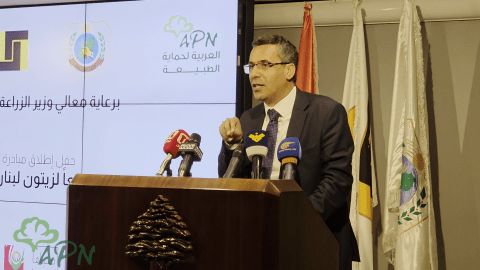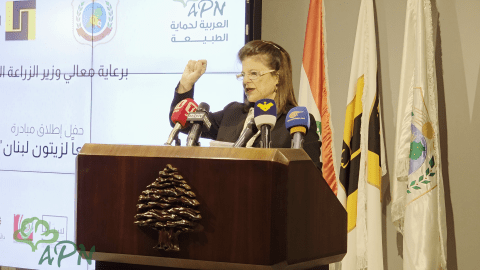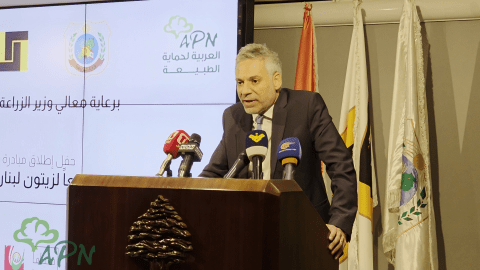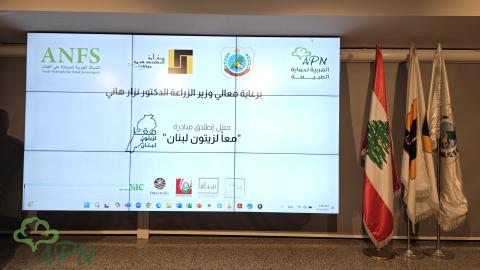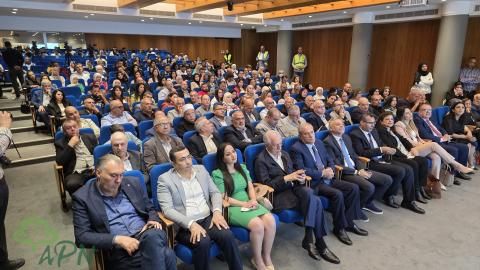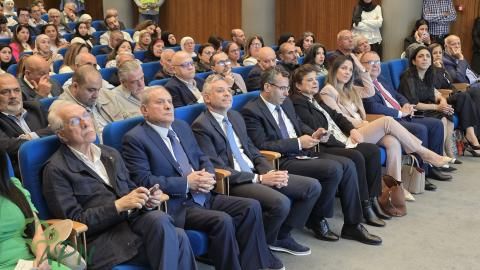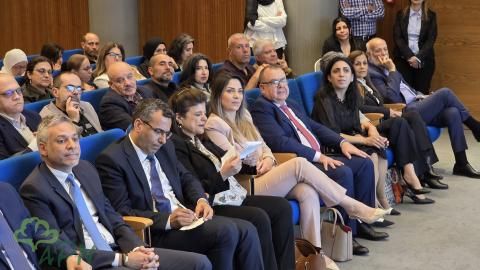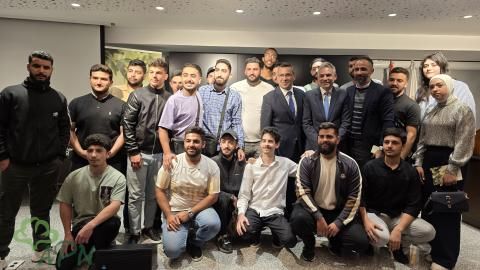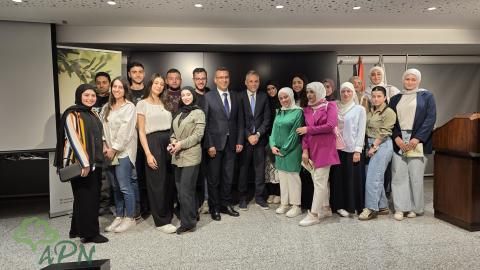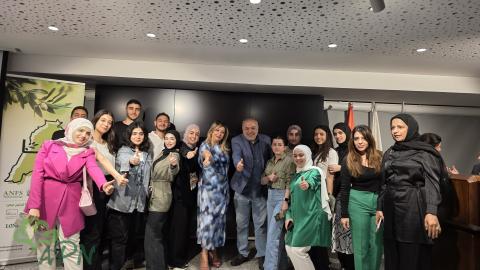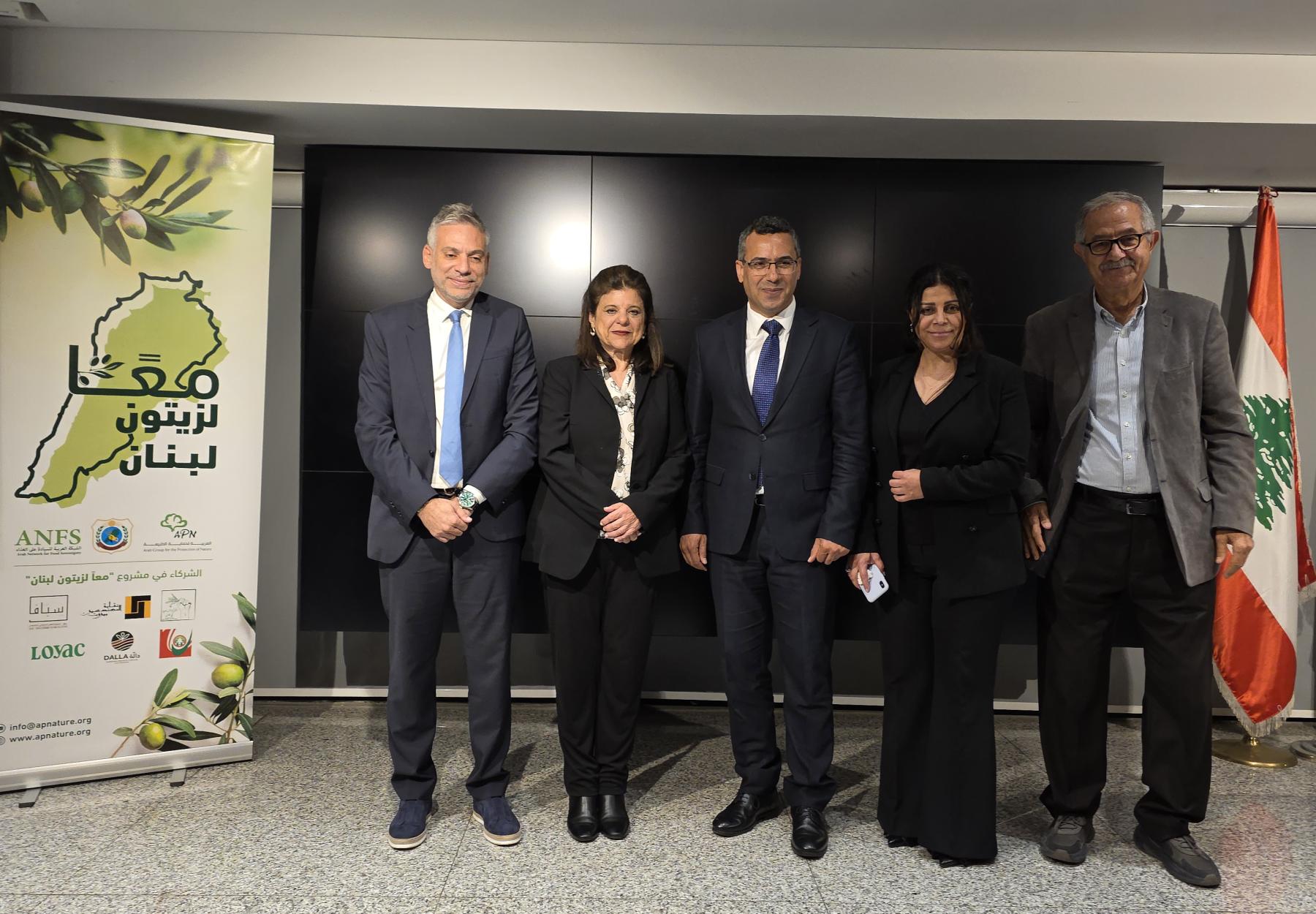
APN | Beirut
25 April 2025
At an official ceremony held at the Order of Engineers and Architects in Beirut, and under the patronage of Lebanese Minister of Agriculture Dr. Nizar Hani, the Arab Group for the Protection of Nature, in partnership with the Arab Network for Food Sovereignty and several civil society organizations, launched the “Together for Lebanon’s Olives” project, aimed at rehabilitating olive farms damaged by the Israeli aggression.
In his speech at the event, Minister Hani emphasized that the message conveyed is one of unity and cooperation between farmers and policymakers, with the goal of standing by the farmers of southern Lebanon and supporting the agricultural sector across the country. He added: “Today we have a real opportunity in Lebanon to work together in the spirit of solidarity because we live on one land and belong to one cause.”
He confirmed that the government is taking practical and well-studied steps, and that rehabilitating the agricultural sector—especially in affected areas—is a top priority, along with developing agricultural extension services, addressing climate change, and adopting modern technologies to keep pace with current challenges.
He added that the Ministry will always stand by the people in supporting the agricultural sector, and will soon launch a national campaign titled "Agriculture is the Pulse of the Land", aimed at highlighting the importance of agriculture and its central role in the national economy. He called, in collaboration with the Arab Group for the Protection of Nature and ministry experts, for support and engagement in this national campaign.
For her part, Eng. Razan Zuayter, APN President said: “This project represents a model of Arab solidarity, where Arab civil society comes together to support Lebanon in a critical moment”, emphasizing that “reviving agricultural land is simultaneously a revival of hope and dignity.”
She added: “Lebanon—the land of cedar and olive—embraces us, and we are doing the least we can for this great country and its proud and free south. On February 28, we planted 200 olive trees in Nabatieh Governorate. Tomorrow we will plant 2,000 more in the soil of the South, in Qana, and our hands will embrace their roots as they return to their land in a unified Lebanese-Arab national campaign for all supporters of Lebanon, inside and outside the country”.
She concluded by recalling the beginnings of APN and its “green resistance” in the year 2000, coinciding with the Second Palestinian Intifada, during which olive trees in Palestine were being uprooted at a rate of one tree per minute at times. She said: “Because we hate injustice, we launched the slogan, “They uproot one, we plant ten” and over the past 25 years, with thousands of volunteers and without any foreign funding, we’ve planted 3.25 million trees, supporting 47,000 farmers who support more than a quarter of a million people. This is in addition to distributing seeds, constructing wells, and providing poultry, fishing nets, bees, and irrigation networks”.
Engineer Fadi Hanna, Head of the Order of Engineers and Architects, said: “To those asking how much olive we’ve lost, I say we lost 70 martyrs who gave their lives to keep the olive trees alive. We, at the Engineers' Syndicate, gave 70 martyrs for the olive tree and for Lebanon—this is the least we can offer for the olive and for the country”.
He added that Lebanon has 11,000 farmers affected by the brutal war, around $750 million in losses in the sector, and 134,000 hectares of damaged agricultural land, with 80% of Lebanon’s agricultural output located in the south. The olive tree, he stressed, is over 6,000 years old and remains a symbol of Lebanon and of peace.
Dr. Nadine Nassif, Dean of the Faculty of Agriculture at the Lebanese University, said: “It pleases me that the olive tree is not just a crop, but a symbol of resilience, belonging, and continuity in our culture and heritage—an integral part of Lebanon’s natural and cultural identity, with roots that go deep into our fertile land”.
She added that the olive tree is a cornerstone for the future of Lebanon’s agricultural sector, which faces new challenges such as environmental pollution, desertification, global warming, and water scarcity, as well as the long-term impacts of war. She stressed the need for new agricultural policies to face these challenges.
Farmer Mohammad Omar, representing farmers affected by the war, said: “We are here today to stand hand-in-hand with APN because the damage inflicted on olive trees has been immense. We are replanting the olive trees—that is our eternal slogan. As farmers, we will remain on our land and never leave it”.
He thanked APN for this project, noting that while the damage was significant, the farmers' resilience was greater. He affirmed: “Every Lebanese is an olive tree”.
The project aims to replant approximately 8,000 dunums (about 800 hectares) of olive farms destroyed by Israeli aggression and to help protect the agricultural heritage and cultural identity associated with this ancient tree. It also seeks to strengthen food sovereignty in Lebanon and to build sustainable partnerships with academic institutions, municipalities, the private sector, Lebanese expatriates, and NGOs.
This project comes amid a severe environmental and agricultural crisis in Lebanon, especially in the South and East, where agricultural lands were systematically destroyed by the Israeli military using internationally prohibited weapons, including white phosphorus, leading to the burning of over 20,000 dunums and the displacement of farmers from around 120,000 dunums more.
Losses in the olive sector by the end of 2024 were estimated at over $236 million, due to the disruption of olive harvesting and the destruction of groves—particularly in the South. More than 56,000 olive trees were lost, including ancient trees, some estimated to be over 150 years old, posing a direct threat to Lebanon’s environmental and cultural identity.
Institutions and organizations involved in the project include: Lebanon’s Ministry of Agriculture, the Agricultural Movement in Lebanon, The Socio-Economic Action Collective (SEAC), Loyac Organization – Kuwait, the Environment and Sustainable Development Unit at the American University of Beirut, Dallah Institute, and the Crisis Response Team at the Lebanese University.
It’s worth mentioning that APN announced the project at the end of February by planting 200 olive trees in several farms in Nabatieh Governorate.
